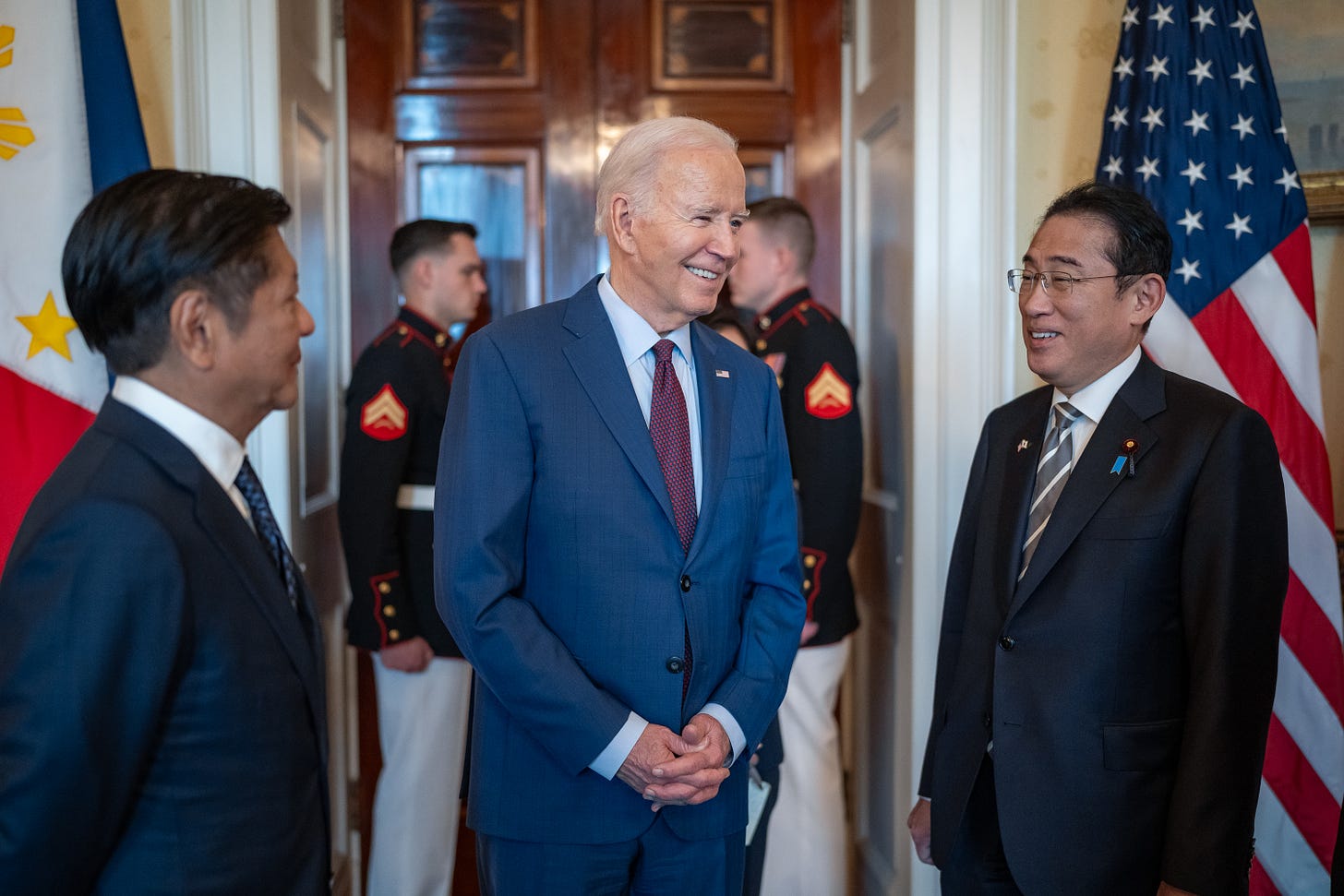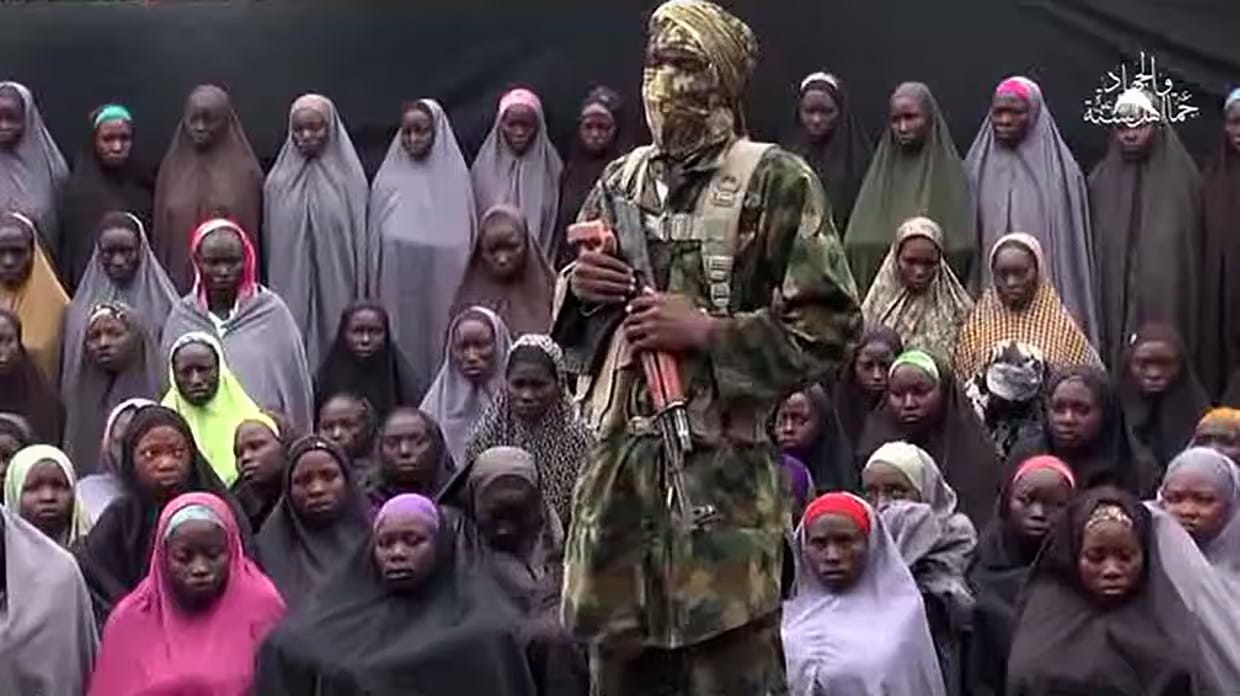The Cosmopolitics Weekend Edit
US flex against China, remembering the Rwanda Genocide and former top military pushes back on Trump's immunity claim. Plus, some lighter weekend fare!

This week, I was privileged to host a couple of events for Blue Star Families, the nation's largest organization dedicated to supporting military families.
At an event on Capitol Hill, members of the House Armed Services Committee's Quality of Life Panel discussed findings from its’s recent report. The proposed GI Bill for Child Care is an example of innovative solutions being put forward to tackle the dual challenges of spouse unemployment and the high cost of child care.
The pressures facing the All-Volunteer Force are intense, and the well-being of their families is directly linked to the nation's security and military readiness. Blue Star Families strives to improve these quality of life issues through advocacy and action. Their "Do Your Part" initiative calls for a whole-of-society response to ensure that military families can thrive. There are steps we can all take as a grateful nation to support the brave families who stand behind our service members.
US hugs Japan, Philippines in warning to China

This week, the Biden administration significantly bolstered its alliances in Asia through high-level summits with Japan and the Philippines. The centerpiece of these efforts was Japan's first state visit in nine years, highlighting a newly-fortified tripartite coalition aimed at countering Beijing's regional ambitions.
The visit was punctuated by a state dinner and consequential talks, where the U.S. and Japan unveiled major enhancements to their military cooperation. These included a new joint command structure and an expansive air missile defense network. Prime Minister Fumio Kishida hailed these developments as crucial for sustaining regional peace and stability. They are set to improve the interoperability of U.S. and Japanese forces, thus better preparing the allies to handle crises, including potential conflicts over Taiwan. The US, UK, and Australia said this week they were considering working with Japan on advanced technology projects in the trilateral Aukus security pact aimed at boosting deterrence against China.
Thursday's groundbreaking three-way summit involving President Biden, Prime Minister Kishida, and Philippine President Ferdinand Marcos Jr not only demonstrated a unified front against Chinese pressure but also marked a significant escalation in collective defense strategies. New commitments to strengthening military and economic cooperation aim to solidify what the administration calls an "overlapping latticework of mutually reinforcing partnerships." This strategic deepening of ties is a direct response to the threat posed by Chinese aggression and North Korean threats.
The inclusion of the Philippines in this alliance—through the expansion of military bases and enhanced coast guard cooperation—represents a strategic broadening of U.S. influence in the Indo-Pacific. This arks a stark departure from the Philippines' earlier, more Beijing-compliant policies under Rodrigo Duterte. President Marcos Jr.'s engagement is a clear pivot towards securing maritime regions and enhancing regional security. Read Manilla’s view
This trilateral summit not only reaffirms the U.S.'s dedication to maintaining a "free and open Indo-Pacific" but also positions Japan and the Philippines as central actors. It sends a clear message to China about coordinated diplomatic actions being undertaken and showcases an proactive strategy to shape the future security landscape of the Indo-Pacific.
Middle East on Edge
It’s an understatement to say that tensions are surging as regional and global powers grapple with the fallout from the recent airstrike in Damascus killing a top Iranian general and six other military officers—an act Iran attributes to Israel. Iran’s pledge to retaliate has prompted urgent calls for restraint from Russia, Germany, and Britain, while Israel asserts its readiness to "meet all its security needs," signaling potential further military actions.
The potential repercussions are influencing global markets, particularly oil prices, due to perceived instabilities in this crucial oil-producing region. Travel advisories and flight suspensions by major airlines like Lufthansa underscore the international community's concern over a spiral into a more extensive regional conflict. The State Department restricted travel for its staff at the U.S. embassy in Jerusalem.
President Biden told repoters Friday he expected an Iranian retaliation against Israel “sooner than later.” Asked what his message was to Iran, he gave his standard reply: “Don’t.”
The Pentagon is beefing up its presence in the region, with President Biden pledging to protect Israel against threats from Iran and its proxies. This position suggests a U.S. expectation of Iranian retaliation that, while significant, is unlikely to provoke a direct American military response, thus maintaining the current regional power balance without escalating to a full-scale war.
The tensions come amid the death of three sons and four grandchildren of Hamas leader Ismail Haniyeh in an Israeli airstrike in Gaza, which Israel's military justified as counterterrorism measures. These actions occur against the backdrop of sensitive ceasefire and hostage negotiations with Hamas. International mediators, including CIA Director Bill Burns, are actively seeking to broker an agreement that hinges significantly on prisoner exchanges. The challenges in these negotiations are exacerbated by uncertainties over the status of Israeli hostages, adding layers of complexity and urgency to the diplomatic efforts aimed at de-escalating the situation.
Fallout is continuing over the Israeli airstrike on a World Central Kitchen convoy in Gaza, killing seven aid workers. Former House Speaker Nancy Pelosi joined over three dozen Democrats, in signing a letter urging President Biden to halt future arms transfers to Israel until a thorough U.S. investigation into the attack is conducted and Israel takes adequate steps to minimize civilian casualties in Gaza. Similarly, in the UK, Prime Minister Rishi Sunak faces pressure to suspend arms sales to Israel following the deaths of British nationals in the same airstrike.
The shadow of Rwanda: 30th anniversary of the Genocide
Rwanda marked the 30th anniversary of the 1994 genocide with a week of commemorations, reflecting on the harrowing 100 days during which up to a million Tutsis and moderate Hutus were systematically slaughtered by Hutu militias. This dark period in human history unfolded as the international community, including the United States, conspicuously failed to intervene—actively choosing not to label the massacre as genocide to avoid the ensuing responsibilities that recognition would demand.
Former U.S. President Bill Clinton, present at the commemorations, acknowledged one of his most profound presidential regrets, saying, “We did not immediately call these crimes by their rightful name: genocide. We cannot change the past, but we can and must do everything in our power to help you build a future without fear.”
In the shadow of these events, Rwanda’s President Paul Kagame seized control and has since governed with stringent authority, often criticized for suppressing the press and stifling political dissent.
The legacy of those 100 days continues to echo through Rwanda's hills, as the small East African nation now wrestles with its complex narrative of recovery and reconciliation amidst continued autocratic governance.
This anniversary also comes at a time when the specter of genocide lingers over current global conflicts. From Ukraine to Gaza, the international community faces accusations of failing to learn from past atrocities and echoing the international failures of 1994. President Joe Biden labeled the Russian atrocities in Ukraine as genocide, and South Africa and others are challenging Israel’s actions in Gaza at the International Court of Justice as genocide- although the U.S. says it has no evidence of that - while Israelis consider Hamas’ October 7 attacks themselves as genocidal.
Nigeria, a decade after Chibok kidnappings

On the tenth anniversary of the Chibok abductions, the specter of that harrowing night continues to cast a long shadow over Nigeria. In April 2014, Boko Haram militants stormed a school in Chibok, Nigeria, kidnapping 276 girls and igniting global outrage symbolized by the #BringBackOurGirls campaign. Endorsed by figures like Michelle Obama and Malala Yousafzai, the campaign seemed a beacon of international solidarity.
After three harrowing years of captivity, 82 girls were released in 2017 through a negotiation that saw Boko Haram prisoners exchanged for their freedom. While a moment of relief, it was not the end of the girls’ ordeal but the beginning of a new chapter of stigmatization and reintegration challenges. The psychological scars are profound. Many of the released girls have had to navigate a society that oscillates between sympathy and censure, with some even carrying children fathered by their captors. Promises made by the Nigerian government have been mired in bureaucracy and betrayal, leaving many of the women to fend for themselves.
As of today, around 100 of the Chibok girls remain missing. Efforts to secure their release have dwindled and subsequent abductions of schoolchildren continue unabated. In a broader sense, the Chibok abductions underscore the persistent vulnerabilities within Nigerian security and the socio-political landscape.
The tenth anniversary is less a milestone of closure but a reminder of the lives disrupted and the global attention that flickered out too soon. The legacy of Chibok is thus a narrative of caution and reflection, a story that asks uncomfortable questions about the efficacy of global advocacy without a depth of enduring commitment, and the realities of those it seeks to aid.
Former top military officers push back on Trump immunity claim
Nineteen former military leaders, including retired four-star generals and top defense officials spanning administrations from John F. Kennedy to recent years, presented an amicus brief to the U.S. Supreme Court opposing granting former President Donald Trump immunity from prosecution, warning of severe repercussions for America's democracy and its stand against global authoritarianism. As the Supreme Court gears up to hear arguments on this issue on April 25, the implications loom large, not just domestically but on the international stage as well.
The intervention is extraordinary because military officials strive to be apolitical. But the 19 argue in the brief that acknowledging Trump’s claim could gravely undermine the military’s adherence to democratic norms and the constitutional order, potentially compelling military commanders and their troops to execute unlawful orders under duress. This scenario, they warn, poses a dire threat to the foundational principles of American governance and could significantly deteriorate trust in military operations, both at home and among global allies. The specter of a military exploited for autocratic purposes, they argue, is a stark deviation from its apolitical and loyal service to the Constitution.
Switzerland violated human rights in landmark International Court Climate case
In a landmark ruling by the European Court of Human Rights, the Swiss government was found to have violated the human rights of its citizens by failing to adequately protect them from the dire consequences of climate change. This case, brought forward by over 2,000 Swiss women, predominantly seniors, has spotlighted the particular vulnerability of older women to climate-induced heatwaves and resulted in a compensatory award of $87,000.
The case serves as a precedent in environmental justice, illustrating a growing judicial recognition of the human rights implications of climate change. The Strasbourg-based court, which is the judicial arm of the Council of Europe, underscored the necessity for member states to accelerate their efforts in reducing greenhouse emissions and safeguarding their populations against environmental disasters.
This ruling does not impose direct sanctions on Switzerland but sets a significant legal benchmark that could influence future climate litigation in Europe. While the court dismissed other high-profile cases, including those brought by young Portuguese activists and a French mayor, the success of the Swiss case marks a pivotal moment for climate justice movements across Europe.
The outcome of this case could encourage similar actions across the Council’s 46 member countries, which includes all 27 EU nations, potentially leading to more stringent environmental policies and greater accountability for governments in addressing the impacts of climate change. The ruling comes as the United Nation’s Climate chief warned this week in a speech at Chatham House that humans have ’two years ‘to save the world’ with stronger action to combat climate change.
Food for Thought
Want to visit Brazil? Bring your bank statements Starting next year, US travelers looking to visit Brazil will be required to provide their bank statements as part of the visa application process. This new requirement aims to ensure that visitors have sufficient funds to support their stay, reflecting broader concerns about the economic impacts of tourism.
Chechnya bans certain music tempos In a controversial move, Chechnya has introduced regulations limiting the tempo of music played publicly to between 80 and 116 beats per minute. This regulation is intended to prevent the "borrowing of musical culture from other peoples," according to local government statements. Artists whose music falls outside these tempo limits, including international stars like Beyonce, Taylor Swift, and Adele, will need to adjust their tracks by June 1 to comply with the new rule.
Striking frescoes unearthed in Pompeii Archaeologists in Pompeii have made a remarkable discovery—a banquet room with walls adorned with frescoes that depict scenes from the Trojan War. This room, measuring 15 meters in length, features intricate artworks that include figures like Helen of Troy and the Greek god Apollo. The frescoes, which date back to the "third style" ornate period of Roman wall painting, around 15 BC to AD 40-50, were likely intended to spark discussions among guests about mythology and fate. The "black room," so named because of its dark-colored walls designed to conceal soot from lamps, offers a stunning insight into the social and cultural dynamics of ancient Rome before the city was buried under volcanic ash from Mount Vesuvius in AD 79.

Lighter Weekend Fare
📺 Watch Earlier this week I wrote about Brandy Hellville & the Cult of Fast Fashion, a new HBO documentary by Australian filmmaker Eva Orner, which explores the impact of the global fashion brand Brandy Melville. This film follows the lifecycle of fast fashion from design tables in Italy to its final resting place in Accra, Ghana, where discarded garments create environmental blight. Orner, known for her 2008 Oscar-winning documentary "Taxi to the Dark Side," also delves into allegations of racism, antisemitism, and sexual assault within the company.
🎙️ Listen Dive into the illustrious history of James Bond with "The James Bond A-Z Podcast," hosted by Tom Butler and Brendan Duffy. This comprehensive podcast offers an encyclopedic look at the franchise's evolution, discussing everything from iconic gadgets and foes to the nuances of each actor who has portrayed the legendary spy to all aspects of the filmmaking process. Created amidst the COVID delays of No Time To Die, it not only celebrates the legacy but also ponders the future of 007 with insightful analyses and guest appearances from industry insiders. This podcast is your definitive guide to the lore and allure of James Bond.
📚 Read "The Insiders' Game: How Elites Make War and Peace" by Elizabeth Saunders explores the influence of elite figures, including presidential advisers, legislators, and military officials, on American foreign policy. Contrary to the traditional view that democratic leaders are restrained by public opinion, Saunders’ analysis of decision-making processes that have shaped U.S. military actions, from the Cold War to the conflicts in Iraq and Afghanista,, shows a small circle of insiders often dictate the beginning and end of military engagements, which are frequently at odds with the broader electorate’s preferences.
Upcoming Release: Alexei Navalny’s memoir is set to be published posthumously in October, his widow announced this week. Navalny's memoirs promise to offer an unprecedented look into the life and challenges of Russia's most prominent opposition leader, providing insights into his political activities, imprisonment, and the internal dynamics of Russian opposition movements before his death in a Russian prison.
Got suggestions for lighter weekend fare? Leave a comment below or DM me!




Good way to start the day … better than a morning paper (which I just spilled my coffee on!)
But, linking the Stars and Stripes article with the actual amicus brief contained was great. While you and S&S describe it perfectly, actually reading the brief has more impact to me.
Sorry, but there do not appear to be any negotiations with Hamas. Israel is negotiating with the US, Qatar and Egypt and has considerably softened its demands. Hamas is not negotiating All they do is demanding an end to the war (that they started) and complete withdrawal of Israeli forces from Gaza. Only if Israel complies are they willing to consider release of hostages (nobody, except Hamas) knows how many are still alive and how many Hamas has murdered in the tunnels. So calling this behaviour “ sensitive negotiations “, in my eyes, is simply incorrect.